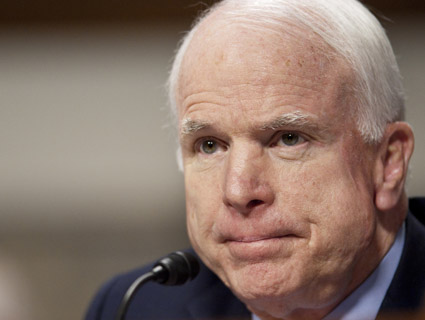
Flickr/<a href="http://www.flickr.com/photos/48089670@N00">Tobym</a>
Earlier this month, the Senate Homeland Security & Governmental Affairs Committee approved the Keeping Politics Out of Federal Contracting Act (KPOFCA), which would prohibit the government from forcing federal contractors to disclose campaign spending and lobbying expenditures as a condition for keeping their contracts. In response, 14 watchdog groups are urging senators to block the bill, condemning it as a “pay-to-play” political maneuver that would make it easier for corporations to peddle influence in the shadows.
The bill is the latest chapter in a debate over transparency for the companies that rake in more than $536 billion in federal contracts annually. In April 2011, the Obama administration drafted an executive order (PDF) that would have required corporations bidding on federal contracts to disclose any political spending greater than $5,000, including money given to dark-money groups such as the Chamber of Commerce that do not disclose their donors. Following staunch opposition from Republicans and the Chamber, President Obama hasn’t acted on the order.
Meanwhile, a rider attached to the 2012 Omnibus Appropriations bill preempted the order by prohibiting the government from requiring corporations to reveal their political spending as a precondition to bid on federal contracts.
Republican supporters of KPOFCA (a.k.a. “kuh-poff-ka”), including its sponsor, Sen. Susan Collins (R-Maine), argue these prohibitions on full disclosure will keep politicians from denying contracts to their political foes. But the bill’s opponents argue that it will encourage lawmakers to reward contractors who have supported them, while keeping important information from the public. As Rick Claypool put it in a post for the advocacy group Public Citizen, which opposes the bill:
According to proponents of KPOFCA, keeping political spending by government contractors secret somehow protects the integrity of the contracting process. If this information is not public, their “logic” goes, then politicians won’t know if a corporation receiving government funds for contracts helped get them elected. (Wink wink. Nudge nudge.)…
Here’s how things work in the real world: If corporations like Lockheed Martin or Academi (formerly Blackwater) want to pour millions to elect a candidate they think will reward them with government contracts, then they will find a way to make sure that the candidate knows. All KPOFCA does is keep the public, not politicians, in the dark.
Of course, not all information about who’s getting federal contracts is a secret, nor is those companies’ spending on candidates and lobbying. (You can look up it up on sites like this and this and this.)
Yet for now there’s no easy way of “connecting the dots,” says Craig Holman, a lobbyist for Public Citizen. More than two years ago, Obama pledged to create a public database that would, in essence, merge these two existing chunks of data. That hasn’t happened. And contractors’ gifts to dark-money groups remain secret, though that could soon change.
Holman believes that Senate Majority Leader Harry Reid (D-Nev.) has no plans to put the bill on the calendar for a vote, but he is concerned that Reid may change his mind if Senate Minority Leader Mitch McConnell (R-Ky.) reaches out to broker a deal, as the two have done with other legislation. “If it does get to the Senate floor it quite possibly could pass,” Holman says, “because there are some Democrats that have bought into the argument” including, he figures, the five who voted for KPOFCA in committee. A companion bill introduced by Rep. Darrell Issa (R-Calif.) would likely pass in the Republican-led House. The White House has not said whether the president would veto it.
If the bill isn’t scheduled for a vote, Holman thinks Senate Republicans may try to hotline it—that is, pass it by unanimous consent without debate. Two leading candidates to block the bill are Sen. Jon Tester (D-Mont.), the only of nine members of the Homeland Security Committee to vote against it, and Sen. Sheldon Whitehouse (D-R.I.), a campaign reform advocate who recently filed an amicus brief urging the Supreme Court to reconsider Citizens United.
Holman says he’s asked Whitehouse to put a hold on KPOFCA unless it’s amended with the DISCLOSE Act, which would require outside spending groups like the Chamber of Commerce to identify any donors who give them $10,000. “The Republicans would never go for that,” he says. “So that would effectively kill it.”















